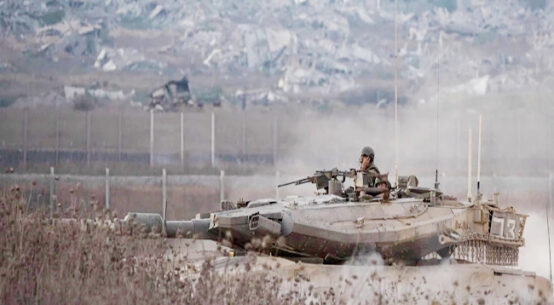Israeli forces kept up their assault on the Gaza Strip on Wednesday and told civilians to leave a refugee camp in the north of the Palestinian enclave after the war reached into Lebanon with the killing in Beirut of the Hamas deputy leader, reports Reuters.
Israel has neither confirmed nor denied that it killed Saleh al-Arouri in a drone strike in the Lebanese capital on Tuesday. But military spokesperson Rear Admiral Daniel Hagari said Israeli forces were in a high state of readiness and prepared for any scenario.
The assassination was a further sign that the nearly three-month war between Israel and Hamas was spreading across the region, drawing in the occupied West Bank, Hezbollah forces on the Lebanon-Israel border, and even Red Sea shipping lanes.
Arouri, 57, who lived in Beirut, was the first senior Hamas political leader to be assassinated since Israel began its offensive against the militant group in response to its deadly rampage into Israeli towns on Oct. 7.
Hamas politburo member Hossam Badran said in a eulogy for Arouri: “We say to the criminal occupation (Israel) that the battle between us is open.”
Hezbollah chief Sayyed Hassan Nasrallah was due to make a speech in Beirut later on Wednesday. Previously he had warned Israel against carrying out assassinations on Lebanese soil, vowing a “severe reaction”.
The heavily armed Hezbollah, a Hamas ally, has been exchanging near-daily fire with Israel across Lebanon’s southern border since the Gaza war began. More than 100 Hezbollah fighters and two dozen civilians have been killed on Lebanese territory, as well as at least nine Israeli soldiers in Israel.
Following Arouri’s killing, the U.N. peacekeeping mission in Lebanon said any escalation “could have devastating consequences for people on both sides of the border”.
In Cairo, Egypt’s President Abdel Fattah al-Sisi told a delegation from the U.S. Congress that the priority was to secure a ceasefire in Gaza.
Sisi stressed the need to prevent the conflict from widening across the region, a presidency statement said.
The Israeli military said in its daily briefing that “intensive battles” with militants were continuing in Gaza on Wednesday in the southern city of Khan Younis. It has said previously it is trying to flush out Hamas leaders in the area.
Residents and Palestinian media said Israeli forces bombed Al-Nusseirat refugee camp in the northern part of the Hamas-ruled enclave overnight and into Wednesday, destroying several multi-floor buildings.
Israel says it tries to avoid harm to civilians. But the total recorded Palestinian death toll had reached 22,313 by Wednesday, 128 of them in the past 24 hours, the Gaza health ministry said.
The war was triggered by a cross-border Hamas assault on Israeli towns on Oct. 7 in which Israel says 1,200 people were killed and some 240 hostages taken back to Gaza.
Since then Israeli bombardments have laid waste to much of the enclave. Its 2.3 million residents are engulfed in a humanitarian disaster in which thousands have been left destitute, crammed into shrinking areas in the hope they are safe, and threatened by famine due to a lack of food supplies.
Iranian foreign ministry spokesman Nasser Kanaani said Arouri’s killing would “ignite another surge in the veins of resistance and the motivation to fight against the Zionist occupiers.”
Israel believes 129 hostages remain in Gaza after some were released during a brief truce in late November and others were killed during air strikes and rescue or escape attempts.
In Lisbon, the European Union’s foreign policy chief Josep Borrell said the international community must impose a solution to the conflict because the two parties would never be able to reach an agreement.
“If this tragedy doesn’t end soon, the entire Middle East might end up in flames,” he said.

